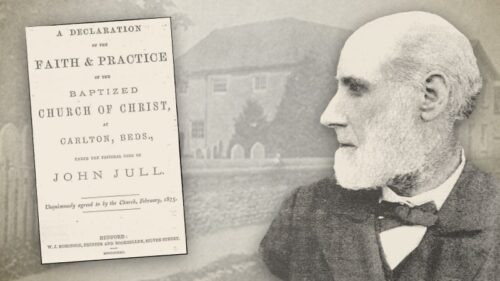-
The Articles Of Faith Of A Strict And Particular Baptist Church
Articles Of The Faith And Order Of A Primitive Or Strict And Particular Baptist Church Of The Lord Jesus Christ, Based On The Declaration Of Faith And Practice Of John Gill, D. D., 1720 Anne Askew, Martyred 1846“I am not she that list My anchor to let fall, For every fleeting mist, My hope’s substantial."Gorge Murrell, St. Neots“I may lose all my friends. Well, be it so, if it is God’s will; but I am determined to go to hevane alone, rather than walk in fellowship with any who repudiate His truth, and decline to obey His commandments.”------------------------------- Introduction: Having been enabled, through Divine grace, to give ourselves to the Lord, and likewise to one another, according to the will of God[1], we count it…
-
Sabbath-Breaking: A Crime Worthy Of Death?
In Numbers chapter 15 an incident is recounted from Israel’s wilderness wandering. It concerns a man who gathered sticks on the sabbath day, and the high cost of his actions. Today, in Britain, we have completely erased capital punishment from the list of possible sentences for wrongdoing. The ultimate act of retribution, the death penalty, is no longer available to judges even for the most heinous of crimes. Sabbath breaking But in Old Testament Israel this was not the case. There were numerous crimes such as murder, adultery and idolatry that earned the punishment of death. However, there were also other crimes such as disobedience towards parents, gluttony, and sabbath-breaking that equally brought down the wrath of the executioner. In our modern culture in which…
-
Banner On Hypers
Letter to the Banner of Truth (not printed) Dear Christian Friends, I was surprised to find myself labeled a Hyper-Calvinist in your February issue with your corollary that I am not amongst those who “confront their hearers with the immediate responsibility of trusting Christ, directly encouraging them to trust him, and appealing to them to do so now!” Naturally, when one starts with a false premise one draws a faulty conclusion. Actually, I abhor Hyper-Calvinism and have aired my views against it in many publications and lectures. I am particularly suspicious of the Supralapsarian kind as found in Calvin’s Institutes, Book III, Chap. XXIII:7 and his Articles Concerning Predestination. I reject Calvin’s studies regarding predestination and election which leave out the covenant of grace and…
-
SINAI – The Way Of Death
Sinai is a desert; a barren, desolate, inhospitable and largely lifeless place. How suitable that God should give the law in Sinai. It is the place of death and the killing letter. Here Moses received the Ten Commandments on two tables of stone. Today travellers to Mount Sinai reach the summit along a steep track of 3,750 so-called steps of penitence between two towering walls of solid rock. It is a fitting reminder of how Moses’ two tablets of stone have, by design, shut out the light of grace and weighed down the poor convicted soul. Making it, says Paul “the ministration of death”. How adamant the “killing letter” of the law has proved to be by its relentless condemnation and its barren, fruitless “yoke…
-
Maurice Roberts And Hyper-Calvinism
Those ‘Theological Swearwords’ ‘Antinomianism and Hyper-Calvinism’ Again Some years ago in the Evangelical Times, one of their directors, John Legg, referred to the terms ‘Antinomianism and Hyper-Calvinism’ as ‘theological swearwords’ and used them indiscriminately with his co-director Errol Hulse to describe my practice of preaching the whole of the gospel to the whole man wherever I was placed by God to do so. This irresistible calling led to my marching 35 kilometers a day through swampy marshland and glacier-covered territory with a map and compass to help me find the way and a fishing rod, snares and a small casting-net in order so I could feed myself so I could take the gospel to nomad Lapps and to my work on and for the Native…
-
Covenant
COVENANT The Scripture sense of this word is the same as in the circumstances of common life; namely, an agreement between parties. Thus Abraham and Abimelech entered into covenant at Beersheba. (Gen. 21:32.) And in like manner, David and Jonathan. (1 Sam. 20:42.) To the same amount, in point of explanation, must we accept what is related in Scripture of God's covenant concerning redemption, made between the sacred persons of the GODHEAD, when the holy undivided Three in One engaged to, and with, each other, for the salvation of the church of God in Christ. This is that everlasting covenant which was entered into, and formed in the council of peace before the word began. For so the apostle was commissioned by the Holy Ghost,…









